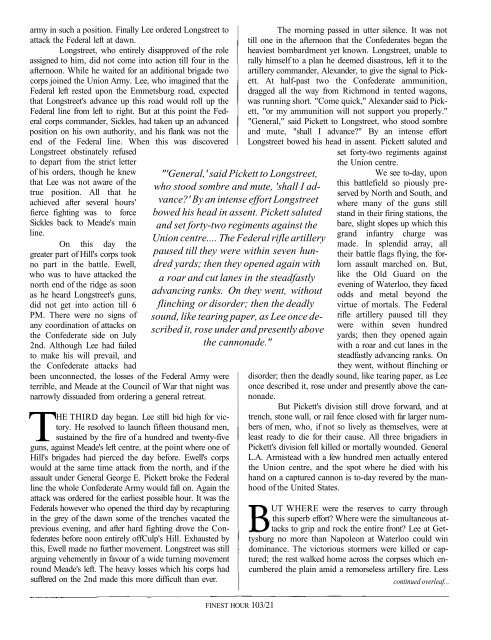.JOURNAL OFTIIE CHURCHILL CKNTER AND ... - Winston Churchill
.JOURNAL OFTIIE CHURCHILL CKNTER AND ... - Winston Churchill
.JOURNAL OFTIIE CHURCHILL CKNTER AND ... - Winston Churchill
- No tags were found...
You also want an ePaper? Increase the reach of your titles
YUMPU automatically turns print PDFs into web optimized ePapers that Google loves.
army in such a position. Finally Lee ordered Longstreet toattack the Federal left at dawn.Longstreet, who entirely disapproved of the roleassigned to him, did not come into action till four in theafternoon. While he waited for an additional brigade twocorps joined the Union Army. Lee, who imagined that theFederal left rested upon the Emmetsburg road, expectedthat Longstreet's advance up this road would roll up theFederal line from left to right. But at this point the Federalcorps commander, Sickles, had taken up an advancedposition on his own authority, and his flank was not theend of the Federal line. When this was discoveredLongstreet obstinately refusedto depart from the strict letterof his orders, though he knewthat Lee was not aware of thetrue position. All that heachieved after several hours'fierce fighting was to forceSickles back to Meade's mainline.On this day thegreater part of Hill's corps tookno part in the battle. Ewell,who was to have attacked thenorth end of the ridge as soonas he heard Longstreet's guns,did not get into action till 6PM. There were no signs ofany coordination of attacks onthe Confederate side on July2nd. Although Lee had failedto make his will prevail, andthe Confederate attacks hadbeen unconnected, the losses of the Federal Army wereterrible, and Meade at the Council of War that night wasnarrowly dissuaded from ordering a general retreat.THE THIRD day began. Lee still bid high for victory.He resolved to launch fifteen thousand men,sustained by the fire of a hundred and twenty-fiveguns, against Meade's left centre, at the point where one ofHill's brigades had pierced the day before. Ewell's corpswould at the same time attack from the north, and if theassault under General George E. Pickett broke the Federalline the whole Confederate Army would fall on. Again theattack was ordered for the earliest possible hour. It was theFederals however who opened the third day by recapturingin the grey of the dawn some of the trenches vacated theprevious evening, and after hard fighting drove the Confederatesbefore noon entirely offCulp's Hill. Exhausted bythis, Ewell made no further movement. Longstreet was stillarguing vehemently in favour of a wide turning movementround Meade's left. The heavy losses which his corps hadsuffered on the 2nd made this more difficult than ever."'General,' said Pickett to Longstreet,who stood sombre and mute, 'shall I advance?'By an intense effort Longstreetbowed his head in assent. Pickett salutedand set forty-two regiments against theUnion centre.... The Federal rifle artillerypaused till they were within seven hundredyards; then they opened again witha roar and cut lanes in the steadfastlyadvancing ranks. On they went, withoutflinching or disorder; then the deadlysound, like tearing paper, as Lee once describedit, rose under and presently abovethe cannonade."The morning passed in utter silence. It was nottill one in the afternoon that the Confederates began theheaviest bombardment yet known. Longstreet, unable torally himself to a plan he deemed disastrous, left it to theartillery commander, Alexander, to give the signal to Pickett.At half-past two the Confederate ammunition,dragged all the way from Richmond in tented wagons,was running short. "Come quick," Alexander said to Pickett,"or my ammunition will not support you properly.""General," said Pickett to Longstreet, who stood sombreand mute, "shall I advance?" By an intense effortLongstreet bowed his head in assent. Pickett saluted andset forty-two regiments againstthe Union centre.We see to-day, uponthis battlefield so piously preservedby North and South, andwhere many of the guns stillstand in their firing stations, thebare, slight slopes up which thisgrand infantry charge wasmade. In splendid array, alltheir battle flags flying, the forlornassault marched on. But,like the Old Guard on theevening of Waterloo, they facedodds and metal beyond thevirtue of mortals. The Federalrifle artillery paused till theywere within seven hundredyards; then they opened againwith a roar and cut lanes in thesteadfastly advancing ranks. Onthey went, without flinching ordisorder; then the deadly sound, like tearing paper, as Leeonce described it, rose under and presently above the cannonade.But Pickett's division still drove forward, and attrench, stone wall, or rail fence closed with far larger numbersof men, who, if not so lively as themselves, were atleast ready to die for their cause. All three brigadiers inPickett's division fell killed or mortally wounded. GeneralL.A. Armistead with a few hundred men actually enteredthe Union centre, and the spot where he died with hishand on a captured cannon is to-day revered by the manhoodof the United States.UT WHERE were the reserves to carry through. this superb effort? Where were the simultaneous attacksto grip and rock the entire front? Lee at Gettysburgno more than Napoleon at Waterloo could windominance. The victorious stormers were killed or captured;the rest walked home across the corpses which encumberedthe plain amid a remorseless artillery fire. Lesscontinued overleaf...FINEST HOUR 103/21

















